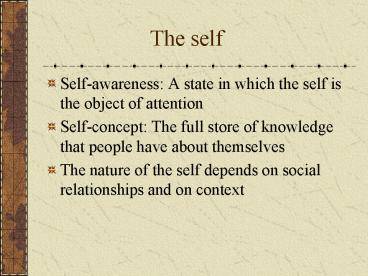The self - PowerPoint PPT Presentation
1 / 14
Title:
The self
Description:
Self-concept: The full store of knowledge that people ... The nature of the self depends on social relationships and on context. Who and ... Lau & Russel (1980) ... – PowerPoint PPT presentation
Number of Views:59
Avg rating:3.0/5.0
Title: The self
1
The self
- Self-awareness A state in which the self is the
object of attention - Self-concept The full store of knowledge that
people have about themselves - The nature of the self depends on social
relationships and on context
2
Who and what is self-aware?
- Gallup et al. (1977)
- Chimps and orangutans appear to be self-aware
other mammals do not - Lewis Brooks-Gunn (1979)
- Most children appear to be self-aware by the age
of 18 months
3
Beyond mere self-awareness
- Who am I?
- Transition from concrete to abstract self-concept
- Independent view of self Views the self as
separate from others and emphasizes self-reliance
and pursuit of personal success - Interdependent view of self Self-concepts are
largely determined by social roles and personal
relationships
4
- Write down all the different domains and roles in
which you view yourself as being a fundamentally
different kind of person, then make a short list
of traits that describe you in reference to each
domain or role - Take 5 minutes and think carefully
- about this
5
Self-complexity
- The number of distinct aspects people use to
define themselves, based on - The number of different domains or roles they
list - Overlap between traits across domains
6
Self-esteem
- The evaluative aspect of the self-concept
- Low self-esteem is associated with psychological
problems - Luckily, most people have high self-esteem
7
Self-promoting biases
- Illusion of Control People tend to believe that
they have more control over their outcomes than
they really have - Langer (1975), twice
- Self-serving bias People tend to attribute
favorable outcomes to themselves and unfavorable
outcomes to external or situational causes - Brown Rogers (1991)
- Lau Russel (1980)
8
More self-promotion
- Unrealistic optimism People are unrealistically
optimistic about their own futures - Better than average effect People tend to
overestimate their own skills, abilities, and
competencies
9
The joys of bias
- Taylor Brown (1988)
- Illusions of control and other biases are less
prevalent among depressed individuals, people in
bad moods, and people with low self-esteem - Therefore, positive illusions might be beneficial
- Positive illusions are related to happiness,
ability to care for others, and capacity for
creative and productive work
10
Why not positive illusions?
- Blame the victim mentality associated with
illusions of control - Conflicts about what is most beneficial in
certain situations like accidents - Behavioral self-blame Blame your specific
behavior for undesirable outcomes - Characterological self-blame Blame your enduring
characteristics for undesirable outcomes (bad
idea)
11
Positive illusions about others
- Swann, Silvera Proske (1995)
- Positive illusions can lead to unnecessary risks
12
Social Comparison
- People evaluate their own attributes by comparing
with other people - Unidirectional drive upward We should want to
compare with people who are equal or slightly
better than we are - Downward comparison But we often dont, as
comparing with inferior others makes us feel
better about our own abilities
13
Basking in Reflected Glory (BIRGing)
- Sometimes we gain self-esteem benefits by
comparing with successful others - Self-evaluation maintenance model Choice to
socially compare or BIRG depends on - Closeness of comparison other
- Performance quality
- Relevance of performance domain
- Tesser and Smith (1980)
14
Self-enhancement
- The motivation to maintain a positive view of the
self - People seek more information about their
strengths than about their weaknesses - Positive traits are viewed as more
self-descriptive than negative traits - People overestimate their contribution to group
efforts - People view their flaws as common but their
virtues as rare and distinctive - People view themselves as better than others































